
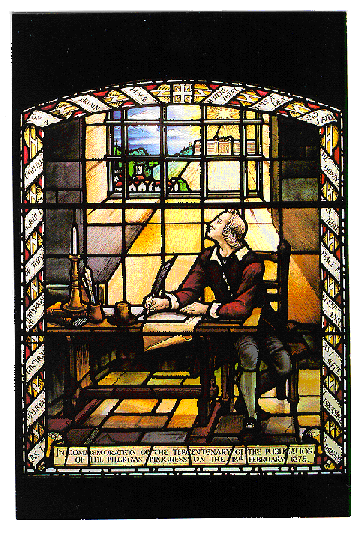
The Pilgrim's Progress
As I walked through the wilderness
of this world, I came to a place where there was a Den, and I lay down
in that place to sleep; and as I slept, I dreamed a dream. I dreamed,
and behold, I saw a man clothed with rags, standing in a certain place,
a book in his hand, and a great burden upon his back. I looked, and
saw him open the book and read in it; and as he read, he wept and trembled;
and not being able any longer to contain himself, he broke out with a lamentable
cry, saying, "What shall I do?"
In such distress he went home and
spoke to his wife and children: "Oh, my dear wife," said he, "and
you my children, I am undone by a burden that lies hard upon me.
Moreover, I am certain that our city will be burned with fire from heaven,
and both myself, with you my wife, and you my sweet babes, shall miserably
come to ruin, unless somehow we can all escape."
As he spoke, his family was amazed,
not because they believed what he had said to them was true, but because
they thought that some frenzy had got into his head. Therefore, it
drawing towards night, and hoping that sleep might settle his brains, with
all haste they got him to bed. But the night was as troublesome to
him as the day, and instead of sleeping, he spent it in sighs and tears.
Many days he spent like this.
Then one day I saw him walking
in the fields. He was reading in his book, and he was greatly distressed.
As he read, he burst out crying as he had done before: "What shall I do
to be saved?"
I saw also that he looked this way
and that way, as if he would run, yet he stood still because he could not
tell which way to go. I looked then, and saw a man named Evangelist
coming toward him, who asked, "Why do you cry?"
He answered, "Sir, I believe that
I am condemned to die, and after that to come to judgment, and suffer everlasting
fire in hell."
Then Evangelist said, "Why do you stand
still, then?" He answered, "Because I do not know which way
to go."
Then Evangelist gave him a parchment roll,
on which was written, 'Fly from the wrath to come.'
The man read it, and, looking at Evangelist
very carefully, said, "Where must I fly?"
Then Evangelist said, pointing with his
finger over a very wide field, "Do you see yonder wicket-gate?"
The man said, "No."
"Then," Evangelist said, "Do you see yonder
shining light?"
He said, "I think I do."
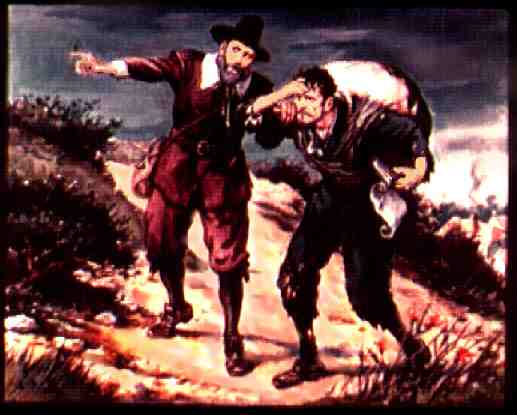
Then Evangelist said, "Keep that
light in your eye, and go up directly to it. It will lead you
directly to the gate."
So I saw in my dream that
the man began to run. He had not run far from his own door, when
his wife and children saw him and began to cry after him to return, but
the man put his fingers in his ears, and ran on, crying, "Life! Life!
Eternal life! So he looked not behind him, but fled towards the middle
of the plain, and in a short time, Christian -- for that was his name --
got up to the gate.
Now, over the gate there
was written, 'Knock, and it shall be opened unto you.' So he knocked.
Soon there came a solemn
person to the gate, named Goodwill, who asked who was there, and where
he came from, and what he would have?
"Here is a poor burdened
sinner," said Christian. "I come from the City of Destruction, but
am going to Mount Zion, so I may be delivered from the wrath to come.
Are you willing to let me in?"
"I am willing with all my
heart," said Goodwill, and with that he opened the gate. "Now,
good Christian, come a little way with me, and I will teach you about the
way you must go. Look before you. Do you see this narrow way?
That is the way you must go. It was cast up by the patriarchs, prophets,
Christ, and his apostles, and it is as straight as a ruler can make it.
This is the way you must go.
"But," said Christian, "are
there no turnings or windings, by which a stranger may lose his way?"
"Yes," said Goodwill, "there
are many ways, and they are crooked and wide. But, only the right
way is the straight and narrow one."
Then I saw in my dream that
Christian departed, and went on till he came to the house of the Interpreter,
where he knocked over and over. At last one came to the door and
asked who was there.
"Sir," said Christian, "
I am a man who has come from the City of Destruction, and am going to the
Mount Zion."
"Then come in," said the
Interpreter. "I will show you what will be profitable to you."
The Interpreter then took
Christian by the hand and led him into a very large parlor that was full
of dust, because it was never swept. After they had been there a
little while, the Interpreter called for a man to sweep. Now when
he began to sweep, the dust flew so abundantly that Christian was almost
choked. Then the Interpreter said to a damsel who stood nearby, "Bring
the water and sprinkle the room." And she swept and cleansed the
room with pleasure.
Then Christian asked, "What
does this mean?"
The Interpreter answered,
"This parlor is the heart of a person that was never sanctified by the
sweet grace of the Gospel. The dust is original sin, and inward corruptions
that have defiled the whole person. She that brought the water and
sprinkled it is the Gospel. So is sin vanquished and subdued, and
the soul made clean through faith.
I saw, moreover, in my dream,
that the Interpreter took him by the hand and led him into a little room,
where two little children sat, each one in a chair. The name of the
eldest was Passion, and name of the other Patience. Passion seemed
to be much discontented, but Patience was very quiet.
Then I saw that one came to Passion, and
brought him a bag of treasure, and poured it down at his feet. He
rejoiced in the treasure, and laughed at Patience to scorn him. But
I saw after awhile that he had squandered all of it away, and had nothing
left but rags.
Then Christian said to the Interpreter, "Explain
this to me."
So, Interpreter said, "Passion represents the people
of this world, and Patience the people of the world which is to come.
As with Passiion, the people of this world must have all their good things
now. They cannot wait till next year -- that is, until the next world
-- for their portion of good.
"Then I perceive," said Christian, "that 'tis not
best to covet things that are now, but to wait for things to come."
"You say truth," said Interpreter. "For the
things that are seen are temporal, but the things that are not seen are
eternal." And with that he said goodbye to Christian.
Now I saw in my dream that the highway up which
Christian was to go was fenced on either side with a wall, and that wall
was called Salvation. He ran along this highway till he saw
two men come tumbling over the wall on the left side of the narrow way,
and they came up beside him. The name of one was Formalist, and the
name of the other Hypocrisy.
"Gentlemen," asked Christian, "Where do you come
from, and where are you going?"
"We were both in the land of Vain-glory, and are
going for praise to Mount Zion," they said.
"Why did you not come in at the gate at the beginning
of the way?" asked Christian.
They said that all their countrymen considered
it too long a journey to come in by the gate, and that, therefore, their
usual way was to make a short cut of it, and to climb over the wall, as
they had done.
"But won't this be counted as a trespass against
the Lord of the city where we are going?" asked Christian.
They told him that he need not trouble his head
about it, for what they did was a custom , that had existed for more than
a thousand years.
"And, besides," they said, "If we get into the
way, what does it matter how we do it? If we are in, we are in!"
I saw then that they came to the foot of the Hill
Difficulty, at the bottom of which was a spring. There were also
in the same place two other ways besides that which came straight from
the gate. One turned to the left hand, and the other to the right,
at the bottom of the hill. But the narrow way lay right up the hill.
Christian now went to the spring and drank to refresh
himself, and then began to go straight up the hill. The other two
also came to the foot of the hill, but when they saw that the hill was
steep and high, they decided to go along the other paths which were easier.
These paths were called Danger and Destruction. One led into a great
wood, and the other into a wide field, full of dark mountains. Along
these paths both stumbled and fell, and rose no more.
I looked then and saw Christian going up the hill.
Now about midway to the top of the hill was a pleasant arbor, made by the
Lord of the hill for refreshing weary travellers. When Christian
got there, he sat down to rest. Soon he fell into a fast sleep, which detained
him in that place until it was almost night. When he awoke he hurried
on his way.
He had not gone far when he felt in his bosom
for his parchment roll, that he might read from it and be comforted, but
he felt and found it not. Then Christian was in great distress, and
knew not what to do. At last he thought that his roll must have fallen
out when he slept in the arbor on the side of the hill, and, falling down
upon his knees, he asked God's forgiveness for that foolish act, and then
went back to look for his roll.
On the way he cried out, "Oh, wretched man that
I am, that I should sleep in the daytime! "
When he came to the arbor again, he sat down and
wept. But at last, looking sorrowfully down, he saw his parchment
roll, and, trembling, he quickly took it up and put in into his bosom.
Who can tell how joyful this man was when he had gotten his parchment roll
again. Therefore, he gave thanks to God for directing his eye to
the place where it lay, and with joy and tears set out again on his journey.
Soon he entered a place called the Valley of Humiliation.
He had not gone far when he saw a foul fiend coming over the field to meet
him. His name was Apollyon. This monster was hideous to behold.
He was clothed with scales like a fish. He had wings like a dragon, feet
like a bear, and out of his belly came fire and smoke, and his mouth was
the mouth of a lion. When he came up to Christian, he snarled at
him:
"Where do you come from, and where are you bound?"
"I have come from the City of Destruction," said
Christian, "which is the place of all evil, and I am going to the City
of Zion."
"Then you are one of my subjects," said Apollyon,
"for all the City of Destruction is mine, and I am the prince and god of
it. Why do you run away from me, your king?
"I was born, indeed, in your dominions," said Christian,
"but your service was hard, and I could not live on your wages, 'for the
wages of sin is death.' Now I have given myself to another, to the
king of kings."
Then Apollyon broke out into a grievous rage, saying,
"I am an enemy to this Prince! I hate him and his people!
I will stop you from going with him."
Then Christian replied, "Apollyon, beware what
you do, for I am on the King's highway, the way of holiness. Therefore,
take heed to yourself."
Then Apollyon, seeing his opportunity, came up
to Christian and threw him down, and almost pressed him to death, so that
Christian began to despair of life. But as God would have it, while
Apollyon was readying a fatal blow, Christian nimbly reached for his sword
and said,
"Rejoice not against me, Oh, my enemy. When
I fall I shall arise." And he gave Apollyon a deadly thrust,
which made him fall back, as one that had received a mortal wound.
Christian, perceiving victory, lunged at him again, but
Apollyon spread forth his dragon's wings and sped away, and Christian for
a season saw him no more.
Then Christian continued on his way and met with
no other affront from Apollyon in this valley.
Now as Christian went on his way, he came to a
little hill, and, looking forward, he saw Faithful before him upon his
journey. Then Christian said aloud,
"My honored and beloved brother Faithful, I am
glad that I have overtaken you; and that God has so tempered our spirits
that we can walk as companions on this pleasant path." Then they went on
together.
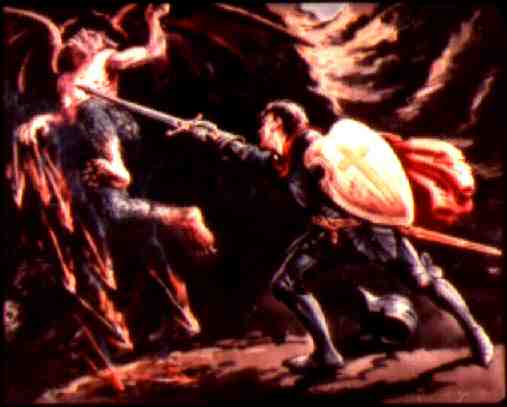
Now I saw in my dream that they came
to a town, and the name of that town was Vanity. And at the town
there was a fair held called Vanity Fair. It was held all year long.
It was called Vanity Fair because all that was sold there, and all that
came there was vanity.
At this fair all kinds of
merchandise was sold: houses, land, honors, titles, countries, kingdoms,
lust, pleasures, and delights of all sorts, such as whores, wives, husbands,
children, masters, servants, lives, blood, bodies, souls, silver, gold,
pearls, precious stones, and what not. And, moreover, at this fair
there were cheats, games, plays, fools, and rogues of every kind.
As Christian and Hopeful
made their way through this town, one vendor mockingly said
to them, "What will you buy?" But they, looking seriously at him
answered, "We buy the truth."
At that, the other vendors
of the town mocked and taunted them even more. And some called upon
others to stone them. But Christian and Faithful were patient and
blessed their accusers, giving good words for bad and kindness for injuries
done.
Now word was soon brought
to the great one of the fair, who quickly came down and instructed some
of his most trustworthy friends to question these men. So the men
were brought to examination, and they were asked where they
came from and where they were going. The men told them that they were pilgrims
and strangers in the world, and that they were going to their own country,
which was the heavenly Jerusalem, and that they had given no provocation
to the men of the town to abuse them so. But their examiners did
not believed them to be mad. Therefore, they took them and beat them,
and smeared them with dirt, and then put them into a cage, that they might
be made a spectacle to all people of the fair.
Then, a convenient time being
appointed, they brought Faithful to his trial. The judge's name was
Lord Hategood. Faithful's indictment was the following:
'That he was the enemy to
and disturber of their trade; that he had made commotions in the town,
and had won support for his own most dangerous opinions, in contempt of
the law of their king.'
Faithful answered
that he had only set himself against those who had set themselves against
Him who is higher than the highest. "And," he said, "As for disturbance,
I make none, being myself a man of peace. And as to the king you
talk of, since he is Beelzebub, the enemy of our Lord, I defy him and all
his angels.'
Then three witnesses came
in: Envy, Superstition, and Flattery. They were asked if they
knew the prisoner at the bar, and what they had to say for their lord the
king against him.
Then they all stood up and
said, "My Lord, this man is one of the vilest men in our country.
We heard him say that Christianity and the customs of our town of Vanity
were diametrically opposite and could not be reconciled, which is to say,
my Lord, that he not only condemns all our laudable doings, but he condemns
us in the doing of them."
Then the judge called to
the jury: "Gentlemen of the jury, you see this man about whom so
great an uproar has been made in this town. You have heard his confession,
and have also heard what these worthy gentlemen have witnessed against
him. It lies now in your hands whether to hang him or save his life.
Then the jury went out.
Their names were Mr. Blind-man, Mr. No-good, Mr. Malice, Mr. Love-lust,
Mr. Live-loose, Mr. Heady, Mr. High-mind, Mr. Enmity, Mr. Liar, Mr. Cruelty,
Mr. Hate-light, and Mr. Implacable. All afterwards unanimously concluded
that Faithful was guilty. Therefore, he was condemned to the
most cruel death that could be invented.
First they scourged
him and then the lanced his flesh with knives. After that they stoned
him with stones, then pricked him with their swords, and last of all they
burned him to ashes at the stake. Thus Faithful came to his end.
Now I saw that there stood behind the multitude a chariot and a couple
of horses, waiting for Faithful, who was taken up into it, and straightway
was carried up through the clouds with the sound of a trumpet, the quickest
way to the Celestial Gate.
As for Christian, He that
overrules all things, brought it about that he escaped from the town
of Vanity and went on his way.
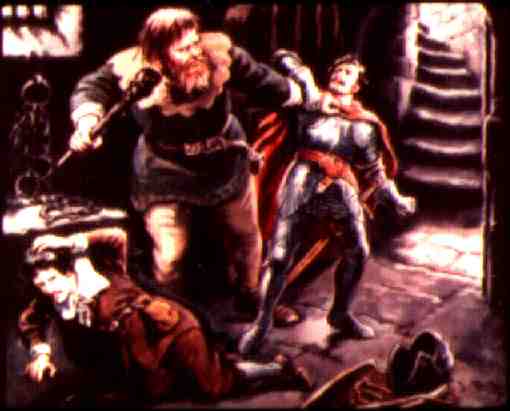
Now I saw in my dream that Christian did not go forth alone,
for there was one whose name was Hopeful, who joined him, and, entering
into a brotherly covenant, told him that he would be his companion.
Thus one died for telling the truth, and another rose out of his ashes
to be a companion for Christian on his pilgrimage.
Now as they went on their way, I saw that it soon
grew dark, and being weary, the two travellers soon fell asleep.
Not far from the place where they lay, there was a castle called Doubting
Castle, and the owner of it was Giant Despair. It was on his grounds
they now were sleeping. In the morning, when he got up and walked
up and down his fields, he caught Christian and Hopeful asleep on his grounds.
"You have this night trespassed on my grounds,"
he said. "Therefore, you must go along with me." The giant then drove
them before him and put them into his castle, in to a very dark dungeon,
nasty and stinking to the spirits of these two men.
When the giant arose the next morning, he got
a grievous crab-tree cudgel, and went down into the dungeon to them, and
started beating them as if they were dogs, although they never said a word.
This done, he withdrew and left them there to mourn under their distress.
So all that day they spent the time in nothing but sighs and bitter lamentations.
When another morning came, the giant went to them in a surly manner as
before. Seeing that they were very sore with the beating he had given
them the day before, he told them that, since they were never likely to
come out of that place alive, their only way would be to make an end of
themselves, either with knife, rope, or poison. With that the
giant looked ugly upon them and withdrew.
When morning came again, and the two prisoners
were still alive, the giant took them into the castle-yard and showed them
a pile of bones and skulls. "These," he said, "were once pilgrims
as you are now, and they trespassed on my grounds, as you have done.
And when I thought fit, I tore them to pieces, and so within ten days I
will do the same to you." And with that he beat them
all the way back to their prison. They lay, therefore, all day on
that Saturday in a lamentable state, as before.
On Saturday about midnight, they began to pray,
and continued in prayer till almost break of day.
Now a little before it was day, good Christian,
as one half amazed, broke out in this passionate speech: "What a
fool am I, thus to lie in a stinking dungeon, when I may as well walk with
liberty! I have a key in my bosom called Promise, that will, I believe,
open any lock in doubting Castle."
"Then," said Hopeful, "that is good news, brother.
Pluck it out of your bosom and try."
Then Christian pulled it out of his bosom, and
began to try at the dungeon door, whose bolt, as he turned the key, gave
way, and the door flew open with ease, and Christian and Hopeful both came
out. Then he went to the outward door that leads into the castle-yard,
and with his key opened that door also. After that, he went to the
iron gate, for that had to be opened, too. Although the lock was
damnable hard, finally the key did open it. Then they thrust open
the gate to make their escape with speed, but that gate, as it opened,
made such a creaking that it awakened Giant Despair, who, hastily rose
to pursue his prisoners, but he was in time only to curse them as they
fled.
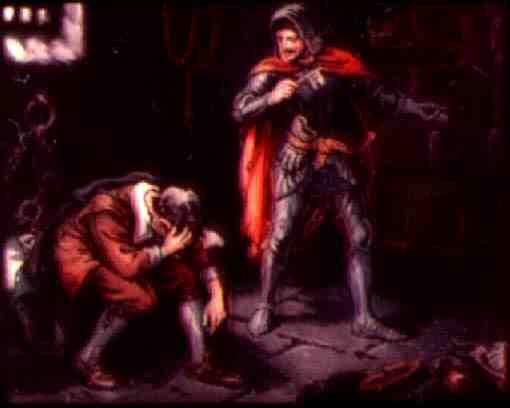
When they came to the King's highway,
they were safe because they were out of the giant's jurisdiction.
Now I saw in my dream that
the pilgrims went on their way and soon came to the country of Beulah,
whose air was very sweet and pleasant. Here they heard continually
the singing of birds, and saw every day the flowers appear in the earth,
and heard the voice of the turtle in the land.
From here they could see
the city they were going to. It was built of pearls and precious
stones, and the streets were paved with gold.
The city stood upon a mighty
hill, but the pilgrims went up that hill with ease, because they had left
their mortal garments behind them. They went up through the regions of
the air, sweetly talking as they went. Near the top they met two
men whose clothes shone like gold.
"You are going, now," said
the Shining Ones, "to the paradise of God, wherein you shall see the tree
of life, and eat of the never-fading fruits thereof. And when you
come in there, you shall have white robes given to you. And you shall
wear crowns of gold, and enjoy the perpetual sight and vision of God.
There also you shall serve him continually with praise, with shouting,
and thanksgiving. There your eyes shall be delighted with seeing,
and your ears with hearing the pleasant voice of the Mighty One.
There you shall enjoy your friends again that have gone there before you,
and there you shall with joy receive every one that follows into the holy
place after you."
Now when they came up to
the gate, there was written over it in letters of gold, 'Blessed are they
that do his commandments, that they may have the right to the tree of life,
and may enter in through the gates of the city.'
Then I saw in my dream that
the Shining Ones asked each man for his parchment roll, which each had
received in the beginning. Then those were carried in to the King,
who, when he had read them, commanded the gate to open, and said, "That
the righteous nation which keeps the truth may enter in."
Now I saw in my dream that
these two men went in at the gate, and lo, as they entered, they were transformed,
and they had clothes put on that shone like gold. And they
were given harps and crowns -- the harps to praise with, and the crowns
in token of honor. Then I heard in my dream that all the bells in
the city rang again for joy, and that it was said unto them, "Enter ye
into the joy of your Lord."
So I awoke, and, behold,
it was a dream.
The Conclusion
Now, READER, I have told my dream
to thee;
See if thou canst interpret it
to me,
Or to thyself; or neighbor, but
take heed
Of misinterpreting; for that, instead
Of doing good, will but thyself
abuse.
And by misinterpreting, evil ensues.
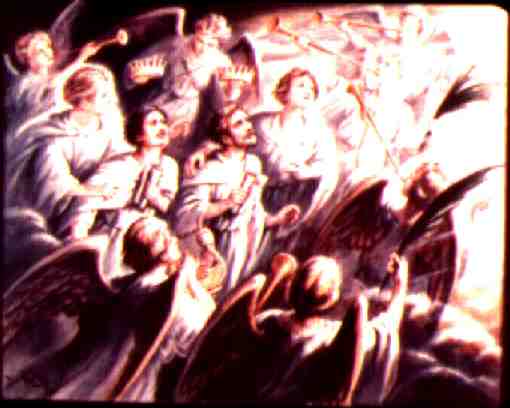
The Pilgrim's Progress

 Return
to Study Guide #1
Return
to Study Guide #1
 Revised
August 31, 2003
Revised
August 31, 2003
by Tom Gallup, e-mail address: [email protected]
West Valley College
http://www.westvalley.edu/wvc/ss/gallup/gallup.html








![]() Revised
August 31, 2003
Revised
August 31, 2003